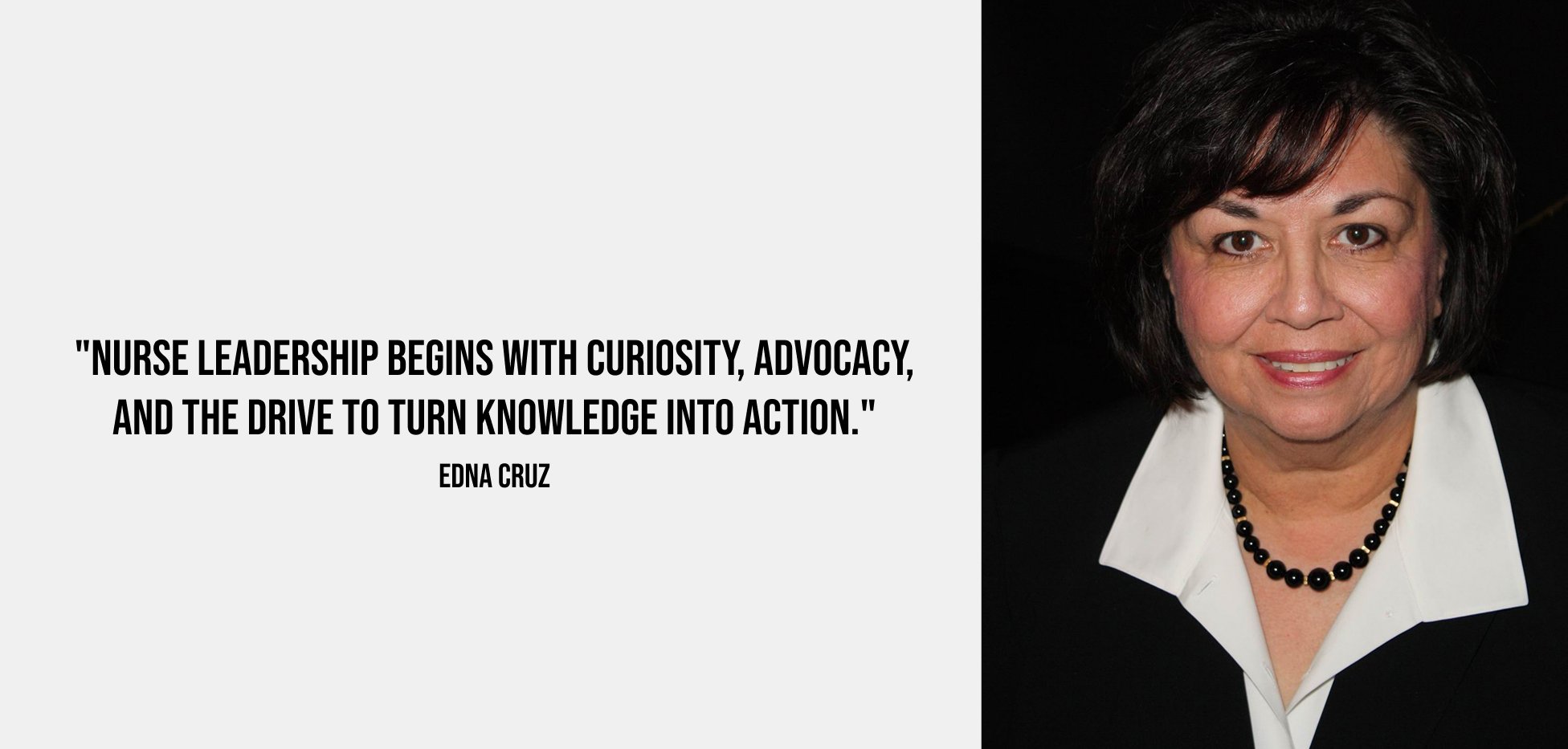
In healthcare, leadership isn’t just about titles—it’s about impact. For Edna Cruz, a proud member of the Nurses on Boards Coalition (NOBC), leadership means showing up for her community and creating space for future generations of nurses. From early days inspired by a love for science to becoming a voice for advocacy and representation, Edna’s journey proves that real change often starts at the bedside and reaches far beyond it.
From Clinical Care to Community Advocacy
How did your experience as a nurse lead you to serve on boards and take on leadership roles in advocacy, research and healthcare strategy?
"Mathematics and the sciences ignited my imagination at a very young age. I saw them not as a burden, but as a door to lifelong curiosity and learning. In nursing, these disciplines are foundational—from dosage calculations to predictive research modeling. Real-life clinical experiences revealed gaps in medicine that could be addressed through research and policy, which led me to advocate for new therapies and public health strategies."
"Today, I serve as a community representative for the UTSA/UTA NIH review panel and on the Bexar County Translational Advisory Board (TAB). TAB brings together healthcare professionals and residents to address community health challenges—like aging—through collaborative events and education. It’s a powerful example of how nurses can extend their leadership beyond the hospital."

Bringing the Patient Voice to Healthcare Strategy
How has serving on boards helped you bring patient and community needs into healthcare decisions?
"I serve on several boards aligned in their mission to improve education and healthcare systems—for both patients and clinicians. The AARP’s Patient and Family Advisory Council (PFAC) is one such initiative. At our meetings, patients and families share stories that highlight unacceptable care or barriers. These narratives inform hospital programs and help shift the healthcare culture toward transparency and accountability."
"As a member of TAB, I also work with organizations like Echo, ReACH, AHEC, IIMS and NIH’s CEAL to amplify patient voices. I recently submitted an abstract to TIPHER on how education and health outcomes are linked—a message I hope will inspire community-wide change."
Closing the Education Gap in Hispanic Communities
You’re passionate about closing the education gap in San Antonio, especially for Hispanic communities. What are the biggest challenges you see, and how can nurses help create more pathways to healthcare education and careers?
"Despite progress, San Antonio still faces entrenched inequalities tied to residential segregation and economic exclusion—issues that go back more than a century. One cultural norm that persists in Hispanic communities is encouraging high school graduates to enter the workforce instead of pursuing higher education, not realizing this can unintentionally perpetuate a cycle of poverty."
"Nurses can play a vital role in addressing this by partnering with local school districts to reach both parents and students. We can help parents create a home environment that supports learning—by turning off TVs and electronics, setting up quiet study spaces for homework and encouraging routines that reinforce structure. Even small actions, like offering planners or positive encouragement, can help keep students on track."
"It’s not always about how much money is invested in education. Sometimes, it’s the intangible support—recognition, belief and guidance—that makes the biggest difference. I know this firsthand. In high school, my principal pulled me aside to tell me my test scores were high enough to consider college. Until then, college wasn’t even on my radar. Later in nursing school, during a tough pediatric rotation, my professor reminded me that a C was still passing—and that C students often make the most empathetic nurses. These instances not only prompted me to pursue a nursing education but also to persevere through what were, for me, the most challenging academic days."
"These small actions—a kind word, a pat on the back or a free lunch—go a long way, even when their situation may feel insurmountable. Let students know they possess the grit and perseverance to overcome any challenge."
Why Nurses Belong in Community Leadership
Why is it important for nurses to get involved in efforts to improve outcomes at the community level?
"Nurses have a discerning perspective on what actions work best when delivering healthcare. By nature, we are community organizers—identifying needs and taking action, whether it’s notifying a physician of a change in condition, leading a process improvement team or submitting a research proposal.
Nurses are also ranked ‘very high’ in honesty and ethical standards for the 23rd consecutive year, according to Gallup’s 2024 poll. With this honor comes responsibility, accountability and transparency.
As nursing expands into the home setting, we’re in the most advantageous position to impact community health. Nurses not only implement discharge plans but help prevent costly ER visits and readmissions. We’re the eyes and ears of the physician, ensuring continuity, cost-effectiveness and patient satisfaction.
National initiatives from the ANA and FDA support recovery at home. With the aging-in-place movement gaining momentum, the FDA is working to integrate healthcare technology and equipment into home care—especially in rural and underserved communities. Nurses will be central to making this model successful."
Advice to Aspiring Nurse Leaders
What advice would you give to nurses—especially those from under-represented backgrounds—who want to lead change?
"We need nurses who reflect the communities they serve. Your cultural knowledge—language, food, traditions—helps make care more relevant and effective. If your community’s outcomes are falling behind, step up and lead a solution."
"Don’t give up or fade into the background. Acclimate, grow your skills. And once you’re ready, explore new environments like case management or patient safety. Challenge yourself. Find a mentor. Push your limits. Nursing needs leaders who care deeply and show up fully."
At Cherokee, we believe that supporting nurses means uplifting the whole system, from the patients you care for to the communities you serve. Leaders like Edna Cruz remind us that nurses are not just caregivers—they're changemakers. Our mission is to honor that role by designing scrubs for nurses that empower confidence, comfort and leadership at every level of care.